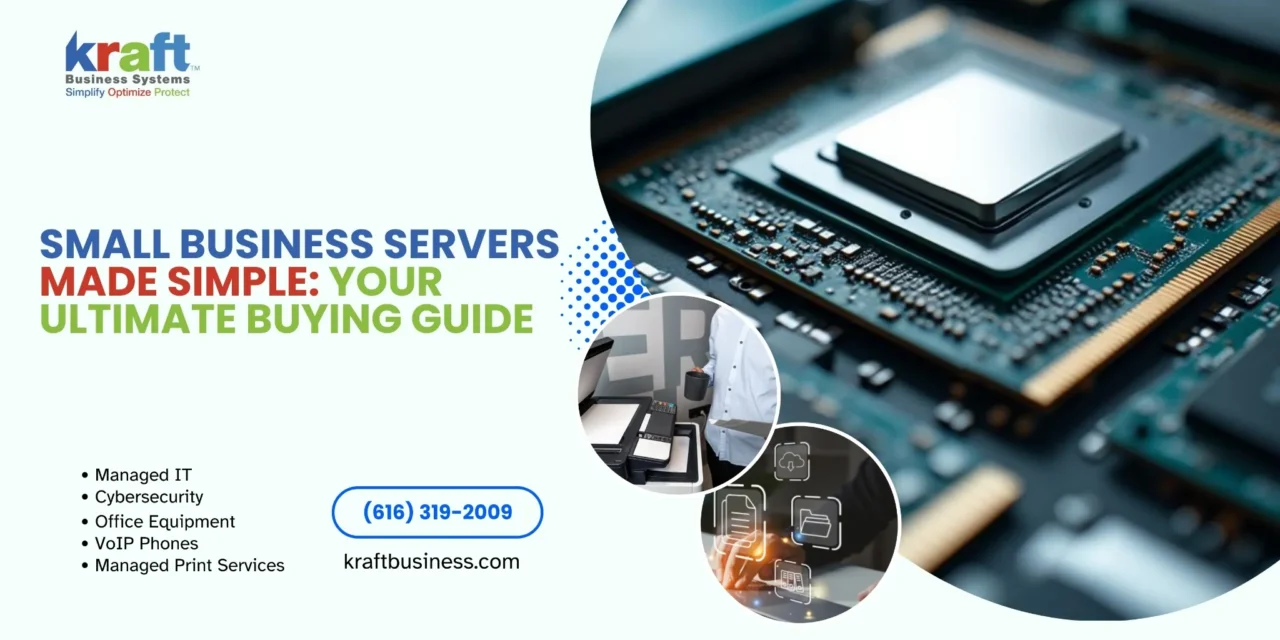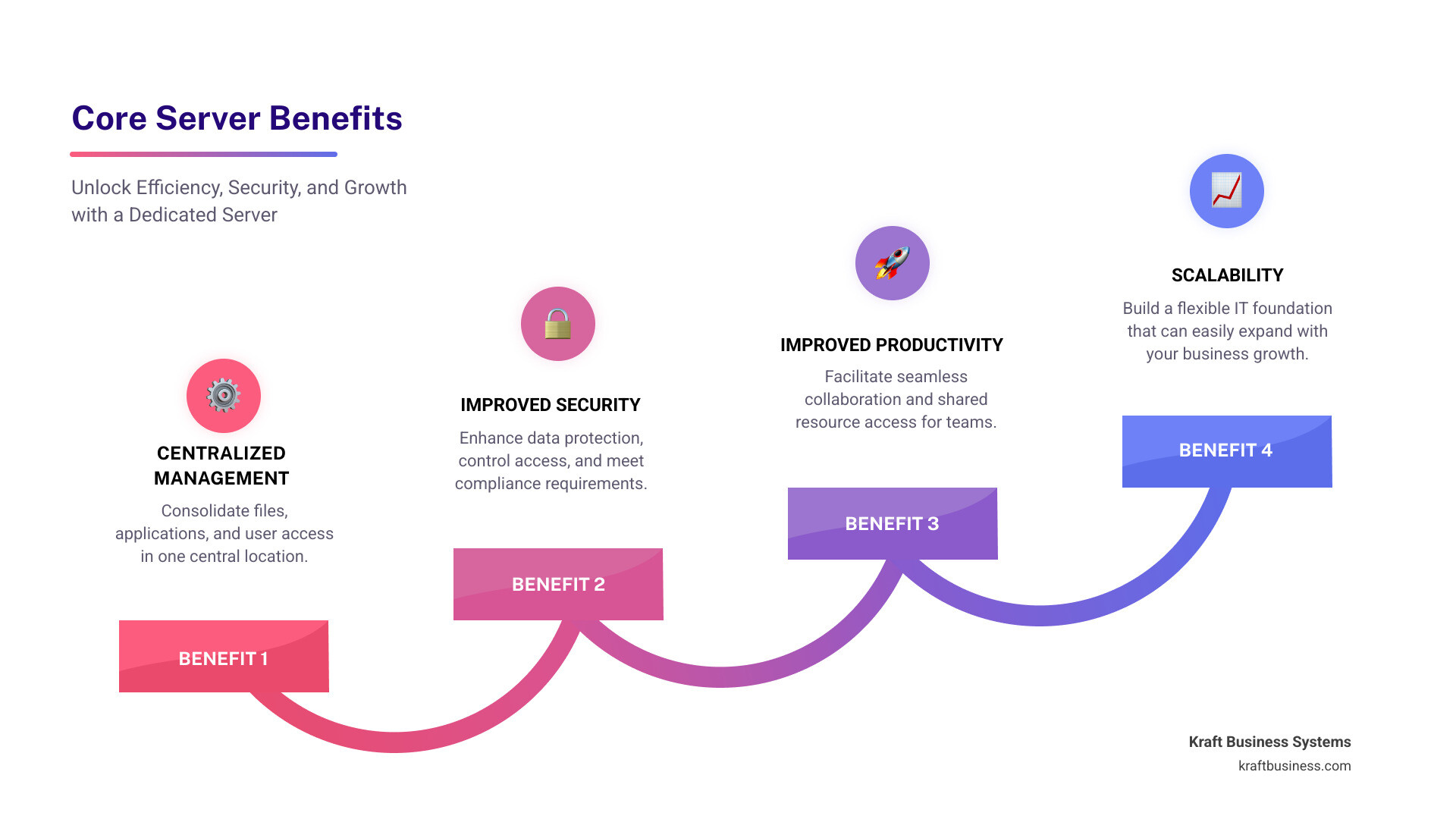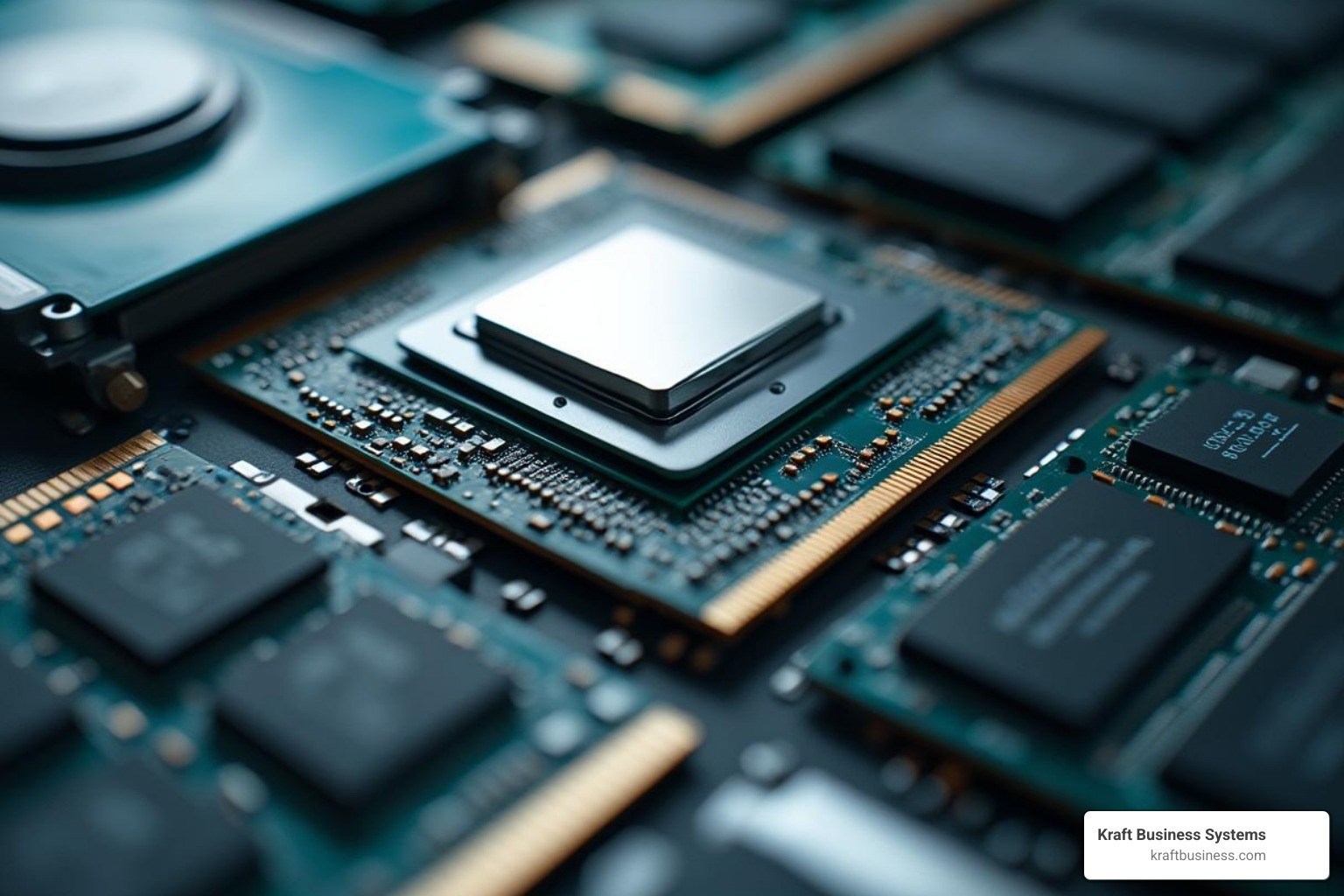If you’re thinking, “I need a small business server,” you’re ready to solve key growth challenges. A server is often the right move when your team is growing, you need to centralize files, improve data security, or meet compliance standards like HIPAA.
Choosing a server can feel complex, but it doesn’t have to be. This guide simplifies the process by breaking down what a server does, the types available, and the key factors to consider. We’ll help you make an informed choice that boosts your business’s efficiency, security, and scalability.
Why Your Small Business Needs a Server: More Than Just Storage
When you think, “I need a server for my small business,” you might just picture a storage box. But a server is the digital backbone of your company, changing scattered operations into a cohesive, secure, and scalable foundation.
Centralize and Streamline Operations
A server acts as the central nervous system for your business. It provides centralized IT management, bringing your files, printers, applications, and email into one secure, accessible place. This eliminates the chaos of hunting for files across different computers and streamlines access to shared resources.
Boost Productivity and Collaboration
Servers significantly improve productivity through shared resources. Teams can collaborate on documents in real-time, eliminating confusing email chains and version control issues. Centralizing tools like CRM and invoicing software ensures faster access to information and consistent performance for everyone.
Strengthen Security and Control
Improved data security and access control are critical. A server allows you to define exactly who can access sensitive information, from financial data to client records. It also centralizes security updates and provides robust firewall capabilities, creating a fortress that protects your entire network far better than individual PCs.
Ensure Business Continuity
Reliable data backup and disaster recovery can save your business from hardware failure, cyberattacks, or other disasters. A server automates backups, minimizing data loss and downtime. This business continuity plan is a safety net that protects your revenue and reputation.
Support Modern Work and Growth
A server is essential for today’s work environment, enabling secure remote access for employees working from home or on the go. It also provides scalability to support future business growth. As your team and data needs expand, your server can adapt by hosting new applications and handling increased workloads, often through virtualization, which maximizes your hardware investment. For businesses in regulated industries, a server is often necessary to meet compliance with standards like HIPAA or PCI.
Choosing Your Server Environment: On-Premise, Cloud, or Hybrid
A crucial step is deciding where your server will live. You have three main options: on-premise (in your office), in the cloud (hosted by a provider), or a hybrid mix of both. The best choice depends on your needs for control, flexibility, and budget.
On-Premise Servers: Full Control
An on-premise server is physical hardware you own and manage at your location.
- Why choose it? It’s ideal when you need full physical control over hardware and security. This is often necessary for businesses handling highly sensitive data (e.g., patient records, intellectual property) or those needing to meet strict compliance regulations like HIPAA or PCI. It’s also a practical choice in areas with unreliable internet or for running legacy applications incompatible with the cloud.
- Considerations: This option requires a significant upfront capital investment in hardware, plus ongoing costs for maintenance, power, and cooling. You are also fully responsible for its management and security.
Cloud Servers: Ultimate Flexibility
A cloud server is a virtual server hosted by a third-party provider in a data center, which you access over the internet.
- Why choose it? Cloud servers offer incredible flexibility and scalability. You can easily adjust resources like storage and processing power, paying only for what you use. This model has lower upfront costs and supports remote work by making data accessible from anywhere. The provider handles all hardware maintenance, updates, and infrastructure management, freeing up your IT resources.
- Considerations: This option involves recurring subscription fees. Your access is entirely dependent on a stable internet connection. You also have less direct control over the hardware, and you must trust your provider’s security and compliance standards.
Hybrid Solutions: The Best of Both
A hybrid approach combines on-premise and cloud servers, allowing you to keep sensitive data in-house while using the cloud for other applications and data. This offers maximum flexibility and can improve disaster recovery by replicating data between the two environments. It’s a balanced strategy for businesses that want control and flexibility.
Step-by-Step Guide: Selecting the Right Server for Your Small Business
Once you’ve decided on the environment (on-premise, cloud, or hybrid), it’s time to choose the server itself. By breaking the process down, you can make a confident choice that fits your business perfectly.
1. Assess Your Needs
Before looking at specs, understand what your business requires.
- Users and Applications: How many employees will use the server now and in the next 3-5 years? What software will you run (e.g., CRM, accounting, industry-specific tools)?
- Data and Growth: How much data do you currently have, and what are your storage needs as you grow? Plan for future expansion to avoid costly upgrades later.
2. Budget and Cost Considerations
Look beyond the initial purchase price to understand the Total Cost of Ownership (TCO).
- Purchase vs. Lease: Buying a server is a capital expense, while leasing is an operational expense with lower initial costs.
- Hidden Costs: Factor in software licenses (e.g., Windows Server), installation, power consumption, and ongoing maintenance.
- Support: Whether on-premise or cloud, you’ll need support. This can be handled by an in-house team or an outsourced Managed IT Services provider like Kraft Business Systems.
3. Recommended Hardware Specifications
The right hardware ensures your server runs smoothly. Here are some general guidelines:
| Business Size | Processor | RAM | Storage |
|---|---|---|---|
| 1-5 users | Quad-core | 16-32GB ECC | 1TB SSD or RAID |
| 6-15 users | 6+ cores | 32-64GB ECC | 2TB+ SSD/RAID |
| 16+ users | 8+ cores | 64GB+ ECC | 4TB+ SSD/RAID |
How to Choose the Right Hardware
- Processor (CPU): The server’s “brain.” Choose business-grade CPUs like Intel Xeon or AMD EPYC, which are built for 24/7 operation. More cores and higher clock speeds mean better performance for your applications.
- Memory (RAM): Aim for a minimum of 16-32GB of ECC (Error-Correcting Code) RAM. ECC RAM is critical for server stability as it detects and corrects memory errors that could corrupt data.
- Storage:
- Drives: SSDs (Solid State Drives) offer fast data access. For top performance, consider NVMe drives, which are even faster.
- Redundancy: RAID (Redundant Array of Independent Disks) is essential. It combines multiple drives to protect your data from a single drive failure. To learn more about the technology, you can read about RAID on Wikipedia. For a business-focused take, see our guide: Do Small Business Servers Need RAID 5?
- Scalability: Ensure your server has empty drive bays to add more storage as your business grows.
- Server Form Factors:
- Tower Servers: Resemble desktop PCs and are great for small offices without a dedicated server room.
- Rack Servers: Compact, slide into server racks, and are efficient for businesses needing multiple servers.
- Blade Servers: Offer the highest density for large-scale computing needs.
Setup, Management, and Ongoing Support
A server isn’t a plug-and-play device. It requires careful setup, ongoing management, and expert support to deliver on its promise of security and productivity.
Expertise Matters
Many business owners are surprised to learn that servers are not just powerful PCs. They use enterprise-grade components and specialized operating systems (like Windows Server) designed for 24/7 reliability and managing network resources.
Proper configuration is key. This includes:
- Initial Setup: Configuring the network, user accounts, permissions, and applications.
- Security Hardening: Implementing firewalls, antivirus, and applying regular security patches to protect against threats.
- Performance Monitoring: Proactively checking server health and resource usage to prevent downtime.
- Backup and Disaster Recovery: Setting up and regularly testing automated backups to ensure your data is recoverable.
Remote Management and Professional Services
Modern servers include remote management tools like Dell’s iDRAC or HP’s iLO, which allow IT professionals to monitor, manage, and fix issues from anywhere, even if the server’s OS is down.
For many small businesses, outsourcing this work to a Managed IT Services provider is the most effective approach. At Kraft Business Systems, our team of dedicated IT professionals handles everything from initial server selection and setup to ongoing monitoring, maintenance, and security. This gives you access to expert guidance and support at a fraction of the cost of a full-time IT department, letting you focus on your business. With local support across Michigan, we’re always nearby when you need us.
Conclusion: Invest in the Right Server for Your Business’s Future
A well-chosen server is a strategic investment in your business’s efficiency, security, and future growth. Whether you opt for an on-premise, cloud, or hybrid solution, the right server will centralize operations, protect your data, and empower your team. By understanding your needs and the available options, you can build a robust IT foundation for long-term success.
Need help designing your IT infrastructure? The experts at Kraft Business Systems are ready to assess your unique needs, recommend the ideal server solution, and provide ongoing support to keep your business running smoothly.
What functions does a server centralize for small businesses?
A server acts as a central hub for critical IT functions. This includes file and printer sharing, making collaboration easy. It also handles reliable data backup and recovery, provides centralized security management, and hosts essential business applications like email, CRM, or accounting software, ensuring they run smoothly and securely for your entire team.
How many servers does a small business typically need?
For most small businesses, one server is sufficient to handle core functions like file sharing, applications, and backups. As your business grows or if you have mission-critical applications, adding a second server for redundancy (a fail-safe) or to separate workloads becomes a smart move. This improves reliability and performance.
How is a server different from a regular desktop computer?
While they may look similar, they are built for different purposes. A server is designed for 24/7, non-stop operation under heavy use. It uses more reliable enterprise-grade components, supports ECC (Error-Correcting Code) RAM to prevent data corruption, and includes features like redundant power supplies and RAID for data protection. Most importantly, it runs a specialized server operating system (like Windows Server) built to manage networks and multiple users, unlike a single-user desktop OS.









